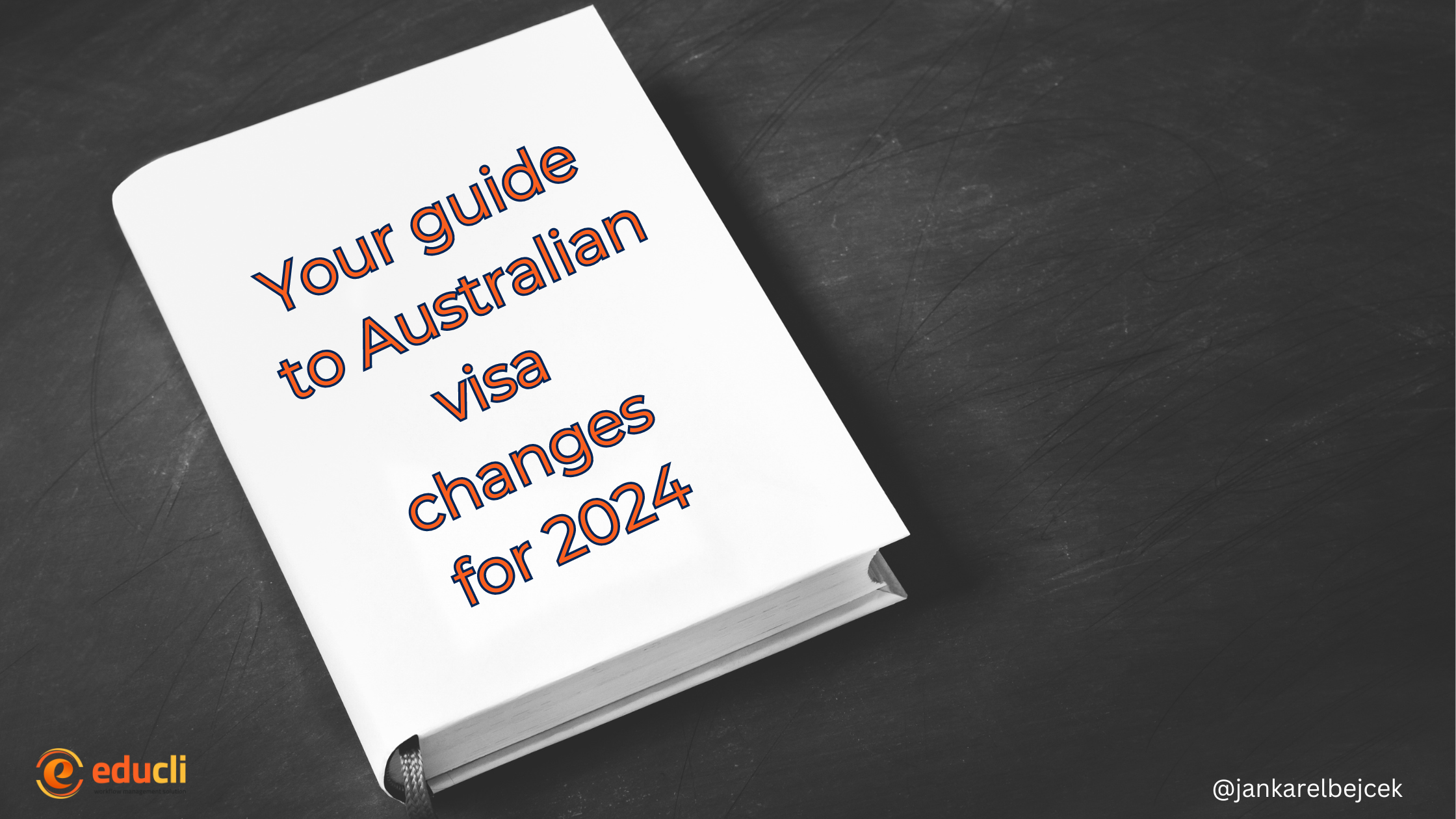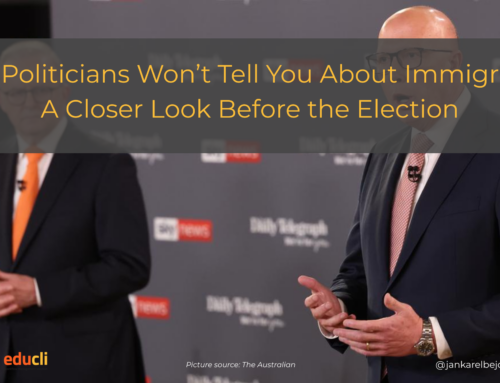Your guide to Australian visa changes for 2024
As part of the Migration Strategy released in December 2023 the Government announced a number of reforms to the international education system in an attempt to support genuine international students applying for a student visa to Autralia. We have prepared a summary of the key changes that took place in 2024.
Overview of the Student and Temporary Graduate visa data
The current Student visa and Temporary Graduate visa program report provides biannual data about the student visa and temporary graduate visa programs administered by the Department of Home Affairs. The report has been produced to assist education providers, representative bodies and policymakers.
In the 2023-24 program year:
- there were 580,193 student visa applications lodged in total – a 1.75% decrease when compared to 2022-23 when 590,304 applications were lodged; and
- 485,124 student visa applications finalised in total – a 29% decrease when compared to 2022- 23 when 687,642 applications were finalised.
- The grant rate for applications lodged in Australia was 83.7%, a decrease from 98.2% in the 2022-23 program year; and
- the grant rate for applications lodged outside Australia was 78.3%, a decrease from 80.4% in the 2022-23 program year.
- On 30 June 2024, there were 608,262 student visa holders in Australia – compared to 568,753 student visa holders in Australia on 30 June 2023, an increase of 6.95%. Of the 608,262 student visa holders in Australia, approximately 368,601 (61%) are studying in the Higher Education sector, followed by approximately 164,382 (27%) studying in the VET sector.
Recent changes in the Student visa program
Student and Student Guardian visa processing priorities – 15 December 2023
Ministerial Direction 107 (MD107) – prioritises visa processing according to provider-level risk, as assessed by their evidence level under the Simplified Student Visa Framework. Low-risk providers will get visa decision outcomes the fastest, while high-risk providers the slowest.
Genuine Student Requirement replaces Genuine Temporary Entrant – 23 March 2024
The Genuine Student requirement changes removed confusion about whether applicants can express a desire to migrate to Australia, requiring evidence of course progression, and helping the Department of Home Affairs identify non-genuine students. A new Ministerial Direction 106 sets out what a decision maker will have regard to when assessing the Genuine Student requirement.
English language requirement increase – 23 March 2024
The minimum English language requirement increased. English language increases will support international students and recent graduates to have a positive educational experience in Australia and provide a greater opportunity to contribute to Australia’s economic growth after graduation, as students with strong English proficiency are better placed to live independently in Australia and engage with the broader community.
Regulations to support section 97 of the ESOS Act – Issuing suspension certificates – 23 March 2024
Section 97 of the ESOS Act provides for the Minister to issue suspension certificates to registered education providers if, in the Minister’s opinion, a significant number of overseas students or intending overseas students are entering or remaining in Australia for purposes not contemplated by their visas. The new provisions support the Immigration Minister’s existing powers under the ESOS Act to suspend education providers from recruiting international students for the period in which any suspension certificate is in force.
English language requirement – Eligible pathway programs – 20 April 2024
As announced on 23 March 2024, the minimum test score required for students undertaking an eligible Pathway program is IELTS 5.5 (or equivalent).
- The minimum score required for a TGV from IELTS test score increases from 6.0 to 6.5 (or equivalent), with a minimum score of 5.5 for each component of the test (reading, writing, speaking and listening).
- The test validity window for a TGV decreases from 3 years to 1 year. TGV applicants now need to provide evidence that they have completed an English Language test within 1 year immediately before the date of the visa application.
Student visa
- The minimum score required for a Student visa from an IELTS test score increases from 5.5 to 6 (or its equivalent).
- The minimum score required to undertake a packaged ELICOS from IELTS increases from 4.5 to 5.0.
- For students studying English only through ELICOS, there will be no change.
- The test score required for students undertaking university foundation or pathway programs that deliver reputable English language training will be IELTS 5.5 (or equivalent).
Increase in financial capacity requirement – 10 May 2024
The amount of money that Student and Student Guardian visa applicants need to have to be eligible for the visa increased to $29,710 for an individual student. This represents 75 per cent of the minimum wage, which is set annually by the Fair Work Commission.
Summary of new funding evidence requirements for student visa applications from 10 May 2024:
- Primary applicant: AUD29,710
- Spouse: AUD10,394 (35%)
- Child: AUD4,449 (15%)
- Annual School fees AUD13,502
- Course fees for the first 12 months, less any fees already paid
- Travel expenses
Student and Student Guardian Visa Application Charge (VAC) increase – 1 July 2024
The VAC for Student and Student Guardian visas increased to $1,600 for a primary applicant, $1,190 for a secondary applicant over the age of 18 and $390 for secondary applicants under 18 years of age. The VAC increase complements a broader reform agenda.
Restricting onshore Student visa hopping – 1 July 2024
Temporary Graduate, Visitor and Maritime Crew visa holders are no longer able to apply for a Student visa while in Australia. Temporary Graduate Visa holders should depart Australia, or find skilled jobs and/or other visa pathways, including those that may lead to becoming permanent residents of Australia. Visitor visa applicants who intend to study will be required to apply for their Student visa from offshore. Student visa applicants genuinely intending to pursue studies in Australia can apply outside Australia. Those who meet the criteria will be granted a Student visa.
Holders of these visas will no longer be allowed to apply from within Australia:
- Temporary Graduate (subclass 485)
- Visitor (subclass 600)
- Electronic Travel Authority (subclass 601)
- Medical Treatment (subclass 602)
- eVisitor (subclass 651)
- Maritime Crew (subclass 988)
No free translations for international students – 1 July 2024
International students studying in Australia are no longer eligible for the Free Translating Service. This change aims to realign the service with its purpose of supporting people settling permanently in Australia. Students who require translation services can still access them through other channels that offer NAATI certified translations, including through the NAATI online directory. See: https://www.naati.com.au/online-directory These services may involve additional costs. Students are encouraged to plan for these expenses in their budget.
OTHER VISAS
Temporary Graduate (subclass 485) visa changes – 1 July 2024
As part of the Migration Strategy, released in December 2023, the Australian Government announced a package of reforms to strengthen and simplify the Subclass 485 (Temporary Graduate) visa (TGV). The Government is committed to repositioning the TGV so that it supports early career professionals to develop the relevant work history they will need to progress to a skilled visa or use their education and skills in the global jobs market.
The length of stay for Temporary Graduate visa (TGV) holders is being reduced, and a new age limit of 35 years on most of the visas is being imposed. Masters or doctorate (PhD) will still be eligible until the age of 50. Hong Kong and British National Overseas passport holders will also still be eligible until age 50.
The length of stay doesn’t change for holders of a TGV in the Post-Vocational Education Work stream — it remains up to eighteen months.
The Temporary Graduate visa (subclass 485) is being streamlined from four streams into three, and renamed as follows:
- Graduate Work Stream → becomes the Post-Vocational Education Work stream
- Post-Study Work Stream → becomes the Post-Higher Education stream
- Second Post-Study Work Stream → becomes the Second Post-Higher Education Work stream
- Replacement Stream → removed
Visa Ballot Process – 1 July 2024
The government is introducing a pre-application ballot process for certain kinds of visas. From 1 July, nationals of China, Vietnam and India who want to undertake a working holiday in Australia will first have to apply for one of a limited number of places via a ballot — which comes with a $25 price tag. If selected, they will then be eligible to apply for the Work and Holiday visa (subclass 462). The ballot will replace the current ‘first-come-first-served’ system, which the government says will make the process fairer and more efficient. That’s because the Work and Holiday visa has caps: for Vietnam, there are 1,500 places, India’s program has not yet commenced, but it’s expected to be set at 1,000. Of the three countries, China has the highest cap, with 5,000 places.
A new visa for young Indian professionals MATES – 1 July 2024
From 1 July, Indian nationals aged 18-30 with qualifications in sought-after technology fields will be eligible for a new temporary visa of up to two years. The program is called MATES, which stands for Mobility Arrangement for Talented Early-professionals Scheme. The pilot program has 3,000 places for primary applicants with qualifications in renewable energy, mining, engineering, information and communication technology, artificial intelligence, financial technology, and agricultural technology. Eligible individuals who win a place in the ballot process can then apply for the visa — for a $365 fee. Immediate family members included on this visa will not count towards the 3,000 place cap.
Temporary work visas – 1 July 2024
There are also some changes to conditions for migrants on certain temporary visas, who will have longer to make arrangements if they stop working with their sponsoring employer. They will now have longer to find a new sponsor, apply for a different visa or arrange to leave Australia:
- 180 days at a time, or
- A maximum of 365 days in total across the entire visa grant period.
Visa holders will be allowed to work for other employers during this time. The changes apply to existing visa holders as well as those granted a visa on or after 1 July.
The changes affect holders of the following visas:
- Temporary Work (Skilled) (subclass 457)
- Temporary Skill Shortage visa (subclass 482)
- Skilled Employer Sponsored Regional (provisional) (subclass 494)
Business Innovation and Investment Program (BIIP) – CLOSED from – 1 July 2024
The government has closed the Business Innovation and Investment (provisional) visa (subclass 188) for new applications. This visa allowed holders to own and manage a business, conduct business and investment activity, or undertake an entrepreneurial activity in Australia.
#studyinaustralia #australiaguide #changes #abroadstudy #temporaryvisa #educli





Leave A Comment